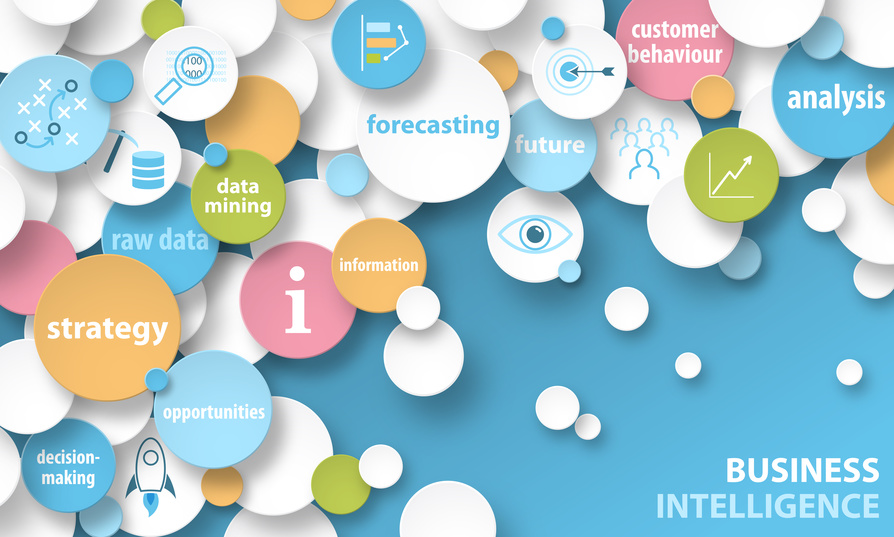
In today’s world information is power, especially when we talk about business decision making. Going down the wrong path because you don’t have access to the right type of information or failure to interpret and understand what that information means can ruin your business. This is not a new problem in our marketplace and there are a few things you can do to make sure that doesn’t happen to you. We live in the technology era, so how can you use that to make the best decisions and grow your business? It’s simple really, and it all comes down to using a business intelligence tool.
What is Business Intelligence?
The term is pretty self-explanatory, but to get more specific, business intelligence refers to the tools and software used to gather, analyze and interpret a business’s raw data in order to create insightful and analytical reports to help with the decision making process. Using the right business intelligence tool for your business will also help optimize internal business processes, increasing productivity and operational efficiency by analyzing the internal data of your company.
But the use of business intelligence tools goes way beyond providing performance reports by helping you understand the particularities of your market, sales trends and the behavior of your customers in order to make the best decision. Combining internal metrics from different departments with external data coming from third-party sources like social media channels, CRM software or macroeconomic data, the right business intelligence tool will help you identify business trends and gain a competitive advantage.
Why you should use business intelligence tools and software?

We live in a highly competitive marketplace that puts a lot of pressure on business owners and managers in charge of making decisions. It’s important to use all the tools at our disposal to make informed decisions that will drive new revenue and help the business grow. One of the main advantages of using a data-driven decision support system like a business intelligence tool is that you don’t have to wait for your IT department to run complex reports. You have access to all the data you need in real time, so you can back-up your decisions with hard numbers.
Let’s say for example your customers are complaining about your customer support services and this is hurting your online reputation. Using the right business intelligence tool will help you spot business problems like this that need to be addressed. Sure, hiring a new customer support specialists means additional costs for your company, but you can base this decision on numbers that show how your company’s reputation will attract new customers, increasing your revenue.
You can also use business intelligence tools to reduce report building costs and staff costs. For example, a healthcare provider decided there was no need to increase their report-building staff by 20% because its IBM Cognos 8 BI deployment was integrated with more than 20 separate Oracle and SQL databases. Using the right business intelligence software provided all the automated reporting they need and hard numbers showed there was no need to increase personnel costs.
How to choose the right business intelligence tool
A business intelligence tool can help you identify trends and patterns that you would otherwise miss, influencing your business decisions through irrefutable analytics and reports. But just like everything else, there are a lot of options to choose from when it comes to the right business intelligence tool. The main thing to remember is that it needs to be right for you. So here is a quick buyers’ guide to choosing the right business intelligence tool and some key factors you need to pay attention to.
Features and functionality
Aside from the price component, which is a subjective element for each company, checking the features and functionality is another key factor when choosing your business intelligence software. The subject has been vastly discussed. Gartner Research Company publishes an annual “Business Intelligence Magic Quadrant and Critical Capabilities Report” where they focus on the key capabilities business intelligence tools should have. Among them, you’ll find security, workflow integration, ease of use, visual appeal, self-contained ETL and data storage, connectivity to external data sources and administration.
Aside from the core functionality each business tool should provide, the ability to integrate it with other statistical programming languages or third-party software can bring a huge plus to the analytical capabilities of the tool.
Security
Keep in mind that your business intelligence tool will be storing confidential information about your employees, pricing strategies, products, marketing goals, sales tactics and workflow. It’s important to rely on a robust encryption mechanism that will keep all of your data safe. Another thing to consider is the ability to assign user roles and permissions when it comes to the internal management of the platform.
Visual Appeal

As valuable as they are, numbers can be hard to interpret when you’re not an analysis specialist. The whole point of a business intelligence tool is to understand how all that valuable data impacts your business in order to make the best decisions. To do that you’ll need visual aids like dashboards, graphs, charts and reports to bring your data to life in a quick and easy to digest manner.
Mobile-ready
Smartphones and tablets have become invaluable resources for our professional lives, making it necessary for business intelligence software to support these platforms. As a small business owner or company manager, it’s important to always have access to key information, even when you’re on the move.
Flexibility and data filtering
Flexibility is another essential feature of a business intelligence tool. For a quick access to the data you’re interested in you’ll need drop-down menus, data filtering and search functionality. This way you can easily navigate from a general performance overview of your business to a more granular view.
Community support
Just like any other software, a business intelligence tool has a learning curve, so you need to make sure you have the resources to support that. Sometimes your needs will go beyond the documentation provided by the vendor, so you might find yourself feeling stuck. In these cases you can hire an IT specialist to clear things up, or you can go online and find support from the community. The most popular business intelligence tools have strong communities like forums or bloggers that provide “how to” videos or tips on how to use more efficiently. You can post your questions on these platforms and get answers from the community, all for free.
In conclusion, choosing the right business intelligence tool for your small business or startup can have a major impact on the future of your company. An unsuccessful implementation or choosing the wrong software for your needs can turn into a waste of time and money. As a business owner, you also need to determine if the new business intelligence tool will work well with your existing infrastructure and if it will require any additional hardware.
If you want to read more about the subject and see a comparison between the best business intelligence tools on the market you can read our post here. Using a business intelligence tool helps business owners to make better decisions based on real-time analysis and a better understanding of their strengths and weaknesses.


 (21 votes, average: 4.10 out of 5)
(21 votes, average: 4.10 out of 5)